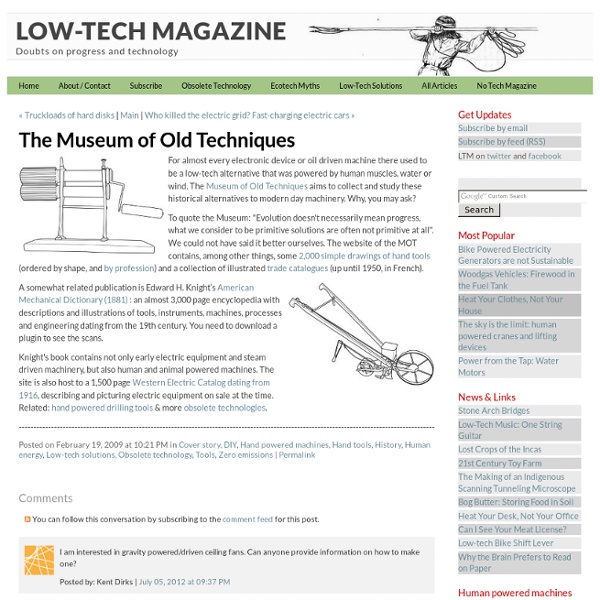Classic manuals online
The following 46 books include many classics for backyarders, homesteaders, small farms and tropical development, many of them hard to find, with direct links to the CD 3rd World online library for free downloading. They are in graphic pdf format, with files from 1 or 2 Mb to 60 Mb. , by Robert Berold et. al., Environmental and Development Agency, Johannesburg, South Africa. 41.7Mb pdf Teknologi Kampungan -- A Collection of Indigenous Indonesian Technologies, by Craig Thorburn, 1982, Volunteers in Asia, ISBN 0917704169. 6.4Mb pdf Village Technology Handbook, Volunteers in Technical Assistance (VITA), 3rd edition 1988, Vita Publications, ISBN 0866192751, 441 p, 14Mb pdf Backyard Composting, by Helga Olkowski, Ecology Center, Berkeley, CA, USA, 1975, 21 pages, 8.5Mb pdf
How-To's: Online Low-Tech Resources
Energy Bulletin pointed us to the website of Practical Action (previously known as the Schumacher Centre for Technology & Development), an online resource devoted to low-technology solutions for developing countries. The site hosts many manuals that can also be of interest for low-tech DIYers in the developed world. They cover energy, agriculture, food processing, construction and manufacturing, just to name some important categories. We would like to add to this the impressive online library put together by software engineer Alex Weir. Other interesting online resources that offer manuals and instructions are Appropedia and Howtopedia. Related: How to make everything ourselves: open modular hardware / The museum of old techniques / Online knotting reference books / UNESCO sets up Traditional Knowledge Database / Primitive technology handbook / Green Wizard Forums / Compendium of Useful Information.
Common-Sense Compost Making - Contents
This book describes a way of making compost, i.e. humus, which is simply, labour saving (no turning) and quick, both in ripening the compost and in getting results in the soil. It is adaptible to all conditions and to every size and type of garden, allotment or farm, the process being based on nature's own methods. Miss Bruce tells how to make use of the natural heat of disintegration, which liberates the vitality of the plants; how to retain that vitality within the heap, and how to quicken both the disintegration of plants and the energizing of humus by treating the heap with a simple activator. From Vegetable Waste to Fertile Soil affirms a belief in the universality of Life, this Life being manifest in varying 'rhythms' in the mineral, vegetable, animal and human kingdoms. Table of Contents Foreword by L.F. Appendices 1. Bibliography How to use Q.R. Photography by W. by L.F. When Dr. For when I first encountered the theories of Dr. Next: 1.
Stitch and Glue Kayak
Although I had never actually kayaked before, one day I decided to make a stitch and glue kayak. For a non-kayaker I'm not sure why, but it had to do with a rowing class I had taken once, and I wanted to get out on the water on my own boat. Also, building a rowing shell seemed difficult, better to start with a kayak. For those of you who don't know, stitch and glue is a well established method of building all kinds of boats. There are some really nice kayak building kits out there, and you will definitely get better results than I did with a kit, but I'm pretty happy with how my kayak turned out. There's a few free kayak plans on the internet. Another option for the true DIY'er is to design your own kayak using FreeShip, DelftShip, or your favorite 3D CAD software. For materials, you will need some thin plywood. To start off with I bought, 30 ft of 6 oz. fiberglass cloth, a gallon of epoxy resin and half gallon of hardener from this online site.
Oil Press
By Jeff Cox -- from Organic Gardening, April 1979, Rodale Press IN 2,500 SQUARE FEET, a family of four can grow each year enough sunflower seed to produce three gallons of homemade vegetable oil suitable for salads or cooking and 20 pounds of nutritious, dehulled seed -- with enough broken seeds left over to feed a winter's worth of birds.The problem, heretofore, with sunflower seeds was the difficulty of dehulling them at home, and the lack of a device for expressing oil from the seeds. About six months ago, we decided to change all that. The job was to find out who makes a sunflower seed dehuller or to devise one if none were manufactured. And to either locate a home-scale oilseed press or devise one. No mean task.Our researches took us from North Dakota -- hub of commercial sunflower activity in the nation -- to a search of the files in the U.S. Tools Required 1. The press was designed so that homesteaders can produce sunflower oil from their own seeds.



